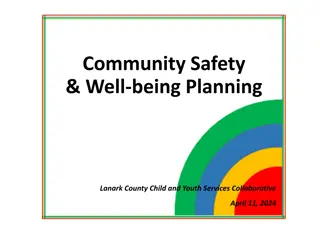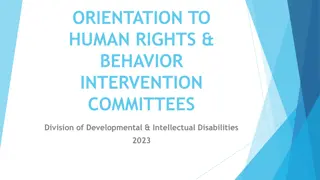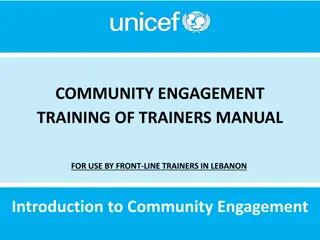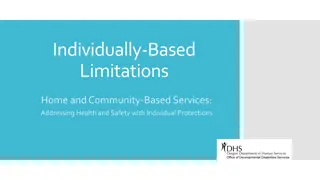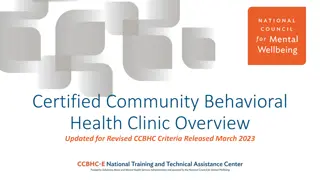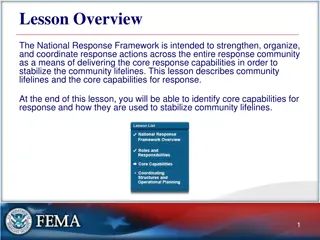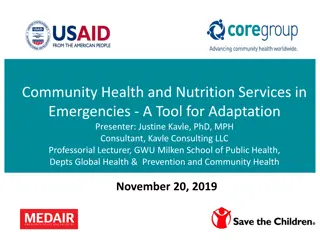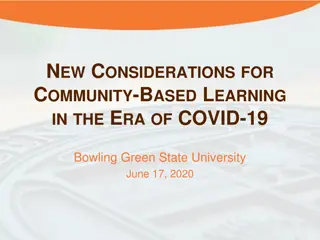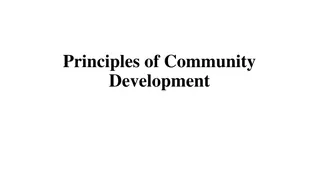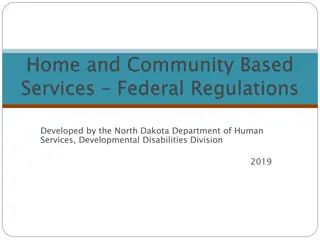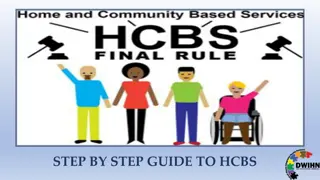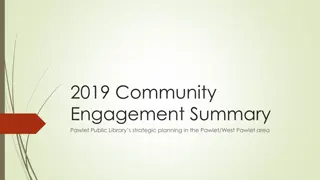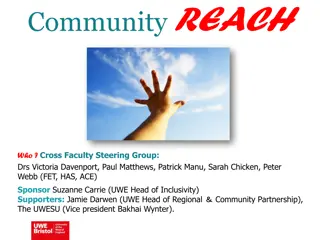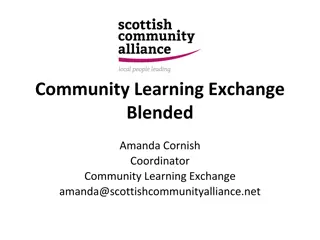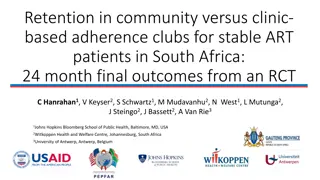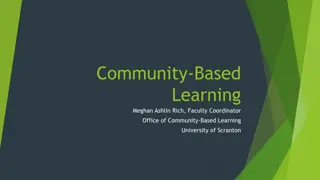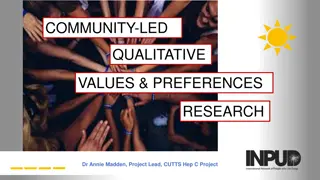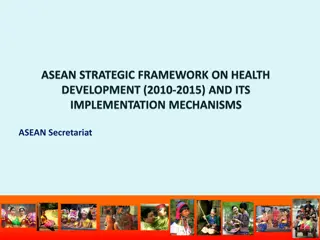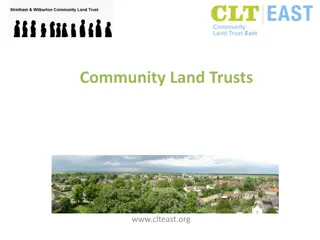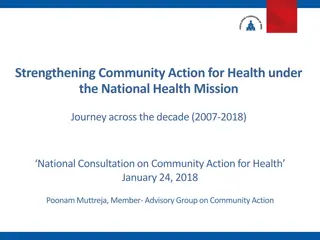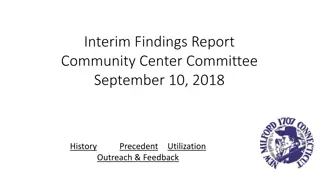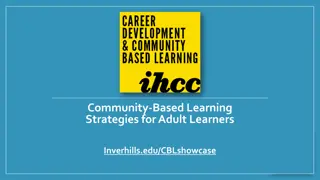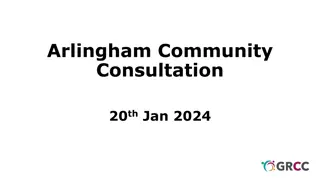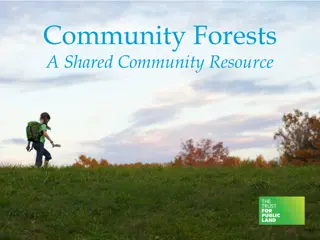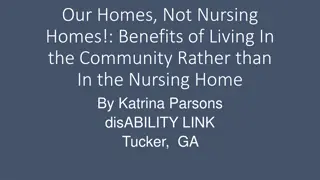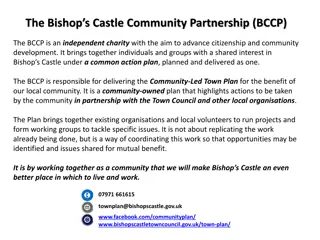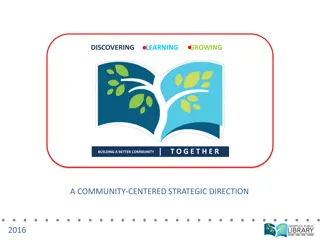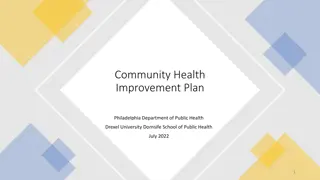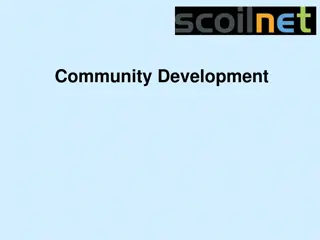Community Policing Division
The North End Tacoma Community Policing Division operates with the aim of coordinating proactive policing efforts with citizens to ensure safety and security in the community. Led by Captain Christopher Travis, the division comprises two lieutenants, an administrative lieutenant, 16 Community Liaiso
2 views • 40 slides
Community-Based Participatory Research for Hard-to-Reach Populations: A Collaborative Approach
This presentation focuses on community-based participatory research for hard-to-reach populations, particularly on implementing harm reduction strategies for amphetamine-type stimulant (ATS) use. It addresses community engagement, outreach to hidden sites, societal perceptions of drug use, and the c
0 views • 25 slides
University of Toledo Office of Community Engagement and Strategic Partnerships Presentation
Ms. Valerie Simmons-Walston, Special Advisor for Community Engagement and Strategic Partnerships, presents the University of Toledo's commitment to community engagement, its core values, and President Postel's vision for adapting and evolving to positively impact students, faculty, staff, and the co
4 views • 19 slides
Community Health Needs Assessment in Victoria: A Focus on Social Determinants
This project focuses on conducting a health needs assessment in a specific community in Victoria, addressing a significant public health concern within the community. It discusses the social risk factors contributing to the chosen issue, policies, community resources, and the nurse's role in improvi
6 views • 8 slides
Collaborative Community Safety and Well-being Planning in Lanark County
The Community Safety & Well-being Planning in Lanark County aims to prevent crisis situations by bringing together human-service sectors through a collaborative approach. Key components include a Situation Table for intervention in high-risk situations and the development of a community plan to addr
0 views • 17 slides
Ensuring Rights and Community Living for Medicaid-funded Home-Based Services
The Home and Community Based Services Settings Rule under Medicaid ensures individuals receiving services have full access to community living benefits, including autonomy, privacy, dignity, and choice in decision-making. The rule emphasizes person-centered planning, integration with the community,
0 views • 23 slides
Community Engagement Training of Trainers Manual for Front-line Trainers in Lebanon
This manual introduces the concept of community engagement, defining what a community is and highlighting its importance. It explores a case study where active community members address health issues through community engagement. The manual emphasizes community-driven development, involvement in dec
0 views • 19 slides
Community-Based Tourism Toolkit for Caribbean MSMEs
Developed by Compete Caribbean Partnership Facility and the Caribbean Tourism Organization, the Community-Based Tourism Toolkit aims to build the capacity of MSMEs in the Caribbean to successfully start, operate, and market community-based tourism experiences. The toolkit includes tools such as the
1 views • 23 slides
Understanding Home and Community-Based Services (HCBS) Requirements
Home and Community-Based Services (HCBS) aim to provide individuals with disabilities the opportunity to live in their communities while ensuring dignity, respect, and choice. Under HCBS regulations, individuals must have access to integrated settings supporting community engagement, employment, and
0 views • 54 slides
Overview of Certified Community Behavioral Health Clinic (CCBHC) Model
The Certified Community Behavioral Health Clinic (CCBHC) model aims to enhance service quality and accessibility by offering integrated, evidence-based, person- and family-centered care. CCBHCs provide a full range of mental health, substance use, and primary care services while emphasizing care coo
0 views • 21 slides
Understanding Community Lifelines and Core Response Capabilities for Stabilizing Communities
The National Response Framework aims to strengthen response actions by coordinating across the entire community to stabilize community lifelines. Community lifelines are critical services essential for human health, safety, and economic security. Stabilizing these lifelines is crucial during respons
2 views • 14 slides
Unlocking the Potential: Benefits of Community Schools
Community schools are neighborhood hubs that offer not only academic education but also various services to support the whole child and the entire community. By addressing obstacles like hunger, health issues, and family instability, community schools improve graduation rates, student performance, a
0 views • 12 slides
USDA Robotic Process Automation (RPA) Assessment and Development Process
The USDA conducted a Robotic Process Automation (RPA) Process Assessment in July 2019, involving process robotics capabilities, development process under the Federated Model, and the lifecycle of a bot project. The RPA development process includes steps like requesting automation, process definition
1 views • 17 slides
Community Health and Nutrition Services in Emergencies - Framework for Adaptation
This presentation by Justine Kavle discusses the CHSD Framework Tool designed to plan and adapt community-based health and nutrition interventions for emergency settings. It emphasizes tools for action planning, best practices, and evidence-based approaches to strengthen programs in both humanitaria
2 views • 21 slides
Results and Learnings from a Community-Based Severe Malaria Project in Rural Zambia
Zambia's community-based severe malaria project has successfully scaled up the use of Rapid Access to Treatment (RAS) strategy, resulting in improved access to malaria case management services. Key success factors include training over 16,500 Community Health Workers (CHWs) since 2017, community mob
0 views • 9 slides
Exploring New Considerations for Community-Based Learning in the COVID-19 Era
Community-Based Learning, also known as service-learning, integrates academic material with relevant community engagement, fostering civic outcomes and public purposes. This session delves into adapting community-based activities to address new needs and opportunities while ensuring safety and flexi
1 views • 23 slides
Key Principles of Community Development
The principles of community development emphasize the recognition of community members' dignity, active participation, self-help, self-determination, and addressing felt needs. These principles stress the importance of respecting the community's resources, involving community members in decision-mak
2 views • 10 slides
Understanding Home and Community Based Services Federal Regulations
Home and Community Based Services Federal Regulations are developed to ensure individuals have full access to community living with maximum choice and control over their lives. Compliance with CMS rules is necessary to receive funding for waiver services. The regulations aim to integrate individuals
1 views • 20 slides
Understanding Home and Community Based Services (HCBS) Final Rule
HCBS, which stands for Home and Community Based Services, provides Medicaid services to individuals with disabilities to support independent living. The HCBS Final Rule, implemented in January 2014, ensures individuals' rights to privacy, dignity, and choice in their living arrangements and communit
0 views • 58 slides
Community Engagement Summary for Pawlet Public Library Strategic Planning
Community engagement summary for Pawlet Public Library's strategic planning in the Pawlet/West Pawlet area includes involvement from various organizations and individuals. The process involved setting aspirations, addressing challenges, and recommending service priorities based on community input. T
0 views • 10 slides
Community REACH: Connecting UWE Students with Bristol Communities
Community REACH is a project aimed at promoting connections between UWE students and community groups in Bristol areas with historically low higher education participation. Through collaborative events and partnerships, the project seeks to raise awareness of UWE as an inclusive university, engaging
0 views • 7 slides
Community Learning Exchange Blended: Empowering Community Groups
Discover how the Community Learning Exchange (CLE) offers community groups a realistic and funded opportunity for shared learning. Administered by the Scottish Community Alliance, the CLE has adapted to virtual formats during lockdowns while working on a blended version for future flexibility. Explo
0 views • 13 slides
Comparison of Community vs Clinic-Based Adherence Clubs for ART Patients in South Africa
This study compares the effectiveness of community-based adherence clubs versus clinic-based clubs in retaining ART patients in care and achieving viral suppression in South Africa. Results from a 24-month randomized controlled trial showed promising outcomes, shedding light on the potential benefit
0 views • 24 slides
Understanding Community-Based Learning at the University of Scranton
Community-Based Learning (CBL) at the University of Scranton integrates theory with practice, engages students with community members, and fosters critical reflection. It prepares students to address societal challenges, identify systemic issues, and nurture a sense of commitment towards underserved
0 views • 27 slides
Community-Led Qualitative Research on LDSS/N Distribution Preferences
Dr. Annie Madden leads a community-led research project focused on the values and preferences of people who inject drugs regarding LDSS/N distribution. The study aims to generate evidence on the feasibility and impact of implementing LDSS/N distribution programs, involving phases from pre-implementa
0 views • 8 slides
Overview of ASEAN Transformation and Objectives Towards a Healthier Community
The ASEAN Secretariat plays a crucial role in the transformation of ASEAN towards the ASEAN Community 2015 objectives, including the ASEAN Political-Security Community (APSC), Economic Community (AEC), and Socio-Cultural Community (ASCC). The ASEAN Vision 2020 emphasizes peace, prosperity, and partn
0 views • 22 slides
Community Land Trusts: Empowering Communities through Collective Ownership
Community Land Trusts (CLTs) are legal entities run by local volunteers to collectively own and manage property/land, undertake development projects, and secure assets for the community. With priorities set by communities to address local issues like affordable housing and recreation, CLTs provide a
0 views • 13 slides
Massachusetts Community College Performance-Based Funding Model
Massachusetts Department of Higher Education has developed a Performance-Based Funding Model for Community Colleges to address funding inequities, allocate funds based on institutional performance, and support workforce readiness. The model was created in consultation with stakeholders and is aimed
0 views • 23 slides
Circle Peacemaking: A Timeless Practice for Community Justice
In the Circle Peacemaking approach, core community values such as respect, forgiveness, love, family, humor/health, honesty, sharing, and leadership are upheld. Guidelines for the process include confidentiality, equal participation, and respectful dialogue. Community justice benefits include commun
0 views • 9 slides
Strengthening Community Action for Health under National Health Mission
Strengthening Community Action for Health under the National Health Mission has been a decade-long journey focusing on improving health outcomes through community involvement and accountability. The Advisory Group on Community Action plays a crucial role in providing technical support, monitoring, a
0 views • 14 slides
Interim Findings Report on New Milford Community Center Committee
The Community Center Committee (CCC) in New Milford has been actively meeting since March 15, 2018, and has been renewed for another six months. The committee's charge includes studying the feasibility of a community center, its composition, operational structure, and finances. The CCC's focus areas
0 views • 27 slides
Exploring Community-Based Learning Strategies for Adult Learners
Dive into the world of community-based learning (CBL) for adult learners at Inver Hills Community College. Discover the definition, benefits, and strategies for adapting CBL to adult learners' needs. Explore the implementation of high-impact practices in educational settings, fostering diverse exper
0 views • 21 slides
Arlingham Community Consultation - Community Development Initiatives Overview
The Arlingham community recently held a consultation to gather feedback on various topics. Initiatives such as Neighbourhood Development Plans, Community Design Statements, and Parish Plans were discussed. These community-driven documents aim to shape local development, influence planning decisions,
0 views • 24 slides
Exploring Community Forests: A Shared Community Resource
Discover the concept of community forests as a shared community resource, encompassing community ownership, participation, and benefits. Learn about models, benefits, and steps in community forest projects, along with real-world examples and the role of project managers in organizations like the Tru
0 views • 13 slides
Benefits of Living in the Community: Our Homes vs Nursing Homes
Living in the community offers numerous advantages over residing in nursing homes, as highlighted by the Olmstead Act case and the importance of community integration for individuals with disabilities. The decision by the Supreme Court emphasized the need to provide community-based services to perso
0 views • 26 slides
Bishop's Castle Community Partnership (BCCP) - Advancing Citizenship and Community Development
The Bishop's Castle Community Partnership (BCCP), an independent charity, works towards advancing citizenship and community development in Bishop's Castle. Through a Community-Led Town Plan and various sustainability projects, the BCCP collaborates with the local community, Town Council, and other o
0 views • 6 slides
Community-Centered Strategic Direction for Building a Better Community
Discovering, learning, and growing together to formulate a community-centered strategic direction in 2016. Leaders focus on what they believe in - connecting, learning, innovating, and collaborating. Their purpose is to inspire the community through enrichment and engagement. Their vision is a vibra
0 views • 6 slides
Philadelphia Community Health Improvement Plan Overview
The Community Health Improvement Plan (CHIP) for Philadelphia was developed in collaboration between the Philadelphia Department of Public Health and Drexel University's Dornsife School of Public Health. The plan focuses on three key areas: social determinants of community violence, public health pr
0 views • 17 slides
Development of Community Psychology in the 1960s: A Historical Perspective
The development of Community Psychology in the 1960s was influenced by social and political movements such as the Civil Rights Movement, the Feminist Movement, and the deinstitutionalization of mental patients. This period saw the establishment of community-based mental health services and the birth
0 views • 9 slides
Community Development: Empowering Local Initiatives for Sustainable Growth
Community development involves local efforts to enhance the living standards by empowering individuals and groups to take ownership of initiatives that address community needs. Essential for developing enterprise in a community are people, organizations, a plan, and finance. The process typically in
0 views • 13 slides




